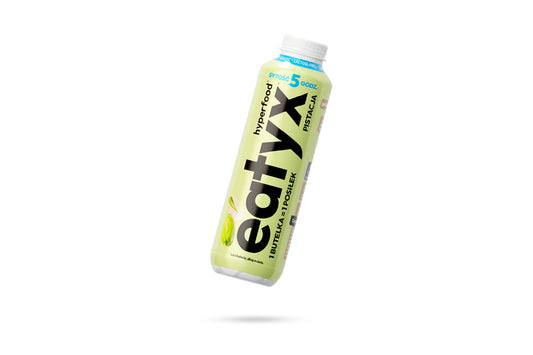Maintaining a proper daily fluid intake balance is one of the key components of a healthy eating pattern. You can often hear the statement that "water is life". There is not even an ounce of exaggeration in this statement. If it weren't for H2O, the Earth would resemble a barren desert. Suffice it to say that the human body is mostly composed of water. What should proper body hydration look like? How much water should you take daily? What is the maximum amount of water you can drink per day? You will find the answers to these questions below.
Our awareness of a healthy lifestyle is increasing. Many people are perfectly aware of how important it is to regularly eat properly balanced meals. We understand the need to limit sugar in the diet. We correctly interpret the role of regular physical activity. We use supplements in capsules or liquid. However, practice shows that many people still ignore the issue of proper body hydration. This is a huge mistake. Did you know that with a supply of water you can survive for up to several days without food? In turn, with a supply of food but no access to water, a person can only survive for a few days. Water is a key chemical compound for our body, which determines the proper course of all processes taking place in it.
How much water to drink a day? Our fluid needs are the result of many factors
How much water to drink a day? When looking for an answer to this question, we will most likely find out that the daily volume of fluids consumed should be in the range of 2 to 2.5 liters. However, it should be emphasized here that this is an average value. You must be aware of the fact that the daily need for fluids is determined by many factors, including:
- age,
- sex,
- body weight,
- physiological condition,
- health,
- level of physical activity,
- the climate we live in.
Approximately 70% human consists of water. What is the exact percentage of proper hydration of the body? In the case of an adult woman, body hydration is 45-60%. When it comes to an adult man, this value is in the range of 50-70%. With all this in mind, it should be concluded that it is impossible to indicate one correct volume of fluids that each of us should take. To put it simply: a 90-kilogram man who practices sports and lives in a hot and dry climate has a different fluid requirement than a 50-kilogram woman who leads a sedentary lifestyle and lives in a place where the temperature is not too high.
Moreover, we cannot forget that water, whether tap or bottled, is not the only source of fluids. A morning cup of coffee also counts towards your daily balance. To maintain good health, do you use a booster , e.g. eatyx HYPER COLLAGEN 20,000 MG BOOSTER ? This way you also hydrate your body. The meals we eat are also a rich source of water. It's not just about soups. Water is found in every food product (unless it has undergone special preservation processes), and it is most abundant in fruits and some vegetables. For example: H2O constitutes approximately 93%. weight of watermelon.
How many liters of water to drink? It is worth using a simple pattern
So how many liters of water should you drink to maintain good health? Individual needs can be calculated in several ways. One of the determinants is body weight. It is recommended to drink 30 ml for each kg. For example, a person weighing 70 kg should drink 2.1 liters of water (70 kg x 30 ml). Another formula assumes drinking 100 ml of water for each kilogram of the first 10 kg of body weight, 50 ml per kilogram of the next 10 kg and 20 ml per kilogram of each subsequent 10 kg. Using this formula, we can conclude that an example person weighing 70 kg should drink 2500 ml of water.
Individual water needs can also be calculated based on the caloric content of your diet. This method assumes that the volume of fluids consumed should increase with the increase in the amount of calories we supply to the body. The conversion rate is as follows: in the case of adolescents, adults and the elderly, 1 ml of water should be consumed per 1 kcal, while children should consume 1.5 ml of water per 1 kcal. Therefore, an adult consuming 2,300 kcal per day should drink 2,300 ml of water.
Should these calculations be considered as the only correct determinant? Well, not entirely. The human body is able to communicate its needs. When we feel thirsty, we should reach for water, regardless of whether we have already exhausted our individual needs.
Hydration of the body – why is it so important?
Why should you keep your body hydrated? You should be aware of the fact that without water the body cannot function properly. Water supports blood flow through blood vessels, supports the function of the digestive system, moisturizes mucous membranes and skin, affects the acid-base and water-electrolyte balance, supports the absorption of water-soluble vitamins, minerals and nutrients, regulates body temperature and provides protection for the most sensitive internal organs. It also helps to remove toxins from the body.
However, it should be emphasized here that if you want to get rid of harmful metabolic products and toxins absorbed from the external environment, it is not enough to drink water. While H2O helps in removing them, it does not neutralize harmful compounds. To cleanse the body, it is worth taking appropriate dietary supplements . eatyx HYPER DETOX 360 is highly effective in this respect.
It is also worth mentioning that proper hydration is not enough to maintain good health. If you want to take care of your body in a comprehensive way, you should remember to eat healthily and meet your needs in terms of ensuring an adequate supply of vitamins and minerals. Eatyx HYPER VITAMINS AND MINERALS + PROBIOTICS will help with this, as it supports the function of the immune system, reduces the feeling of fatigue and adds vitality. Eatyx HYPER 18 VITAMINS & MINERALS is also an excellent choice, a supplement that provides a daily dose of necessary support.
Overhydration – can you drink too much water?
Too little water supply may result in dehydration of the body - a condition that, in extreme cases, can even lead to death. However, you should realize that overhydration is also dangerous. How many liters of water is too much?
Hypervolemia (overhydration) is a rare condition. A healthy person's body can cope with excess fluids. It most often occurs when large amounts of water are consumed at one time (e.g. several liters at a time).



